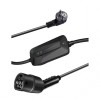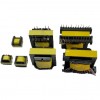The importation process has its own arcane and, for the uninitiated, confusing language. Here are definitions of some of the more common and important terms. They are in alphabetical order.
(a)(1)(A) List -- the list issued by the Customs Service of documents and records that importers and others must keep, retain, and, if the Customs Service demands, produce, or be subject to administrative penalties.
Antidumping Duties -- additional duties imposed on imported merchandise when the imported merchandise is being sold in the United States at less than fair value and is causing material harm to a domestic industry.
Assists -- value or items that an importer provides to its foreign supplier/manufacturer at a reduced rate or free of charge, directly or indirectly, that is used to produce the imported merchandise. The value of the merchandise must reflect this added value.
Bill of Lading -- a document that a transportation company possesses acknowledging that it has received goods, and that temporarily serves as title during transport of the merchandise.
Bonded warehouse -- a warehouse authorized by Customs for storing merchandise on which payment of duties is deferred until the importer pays the duties or until Customs releases the merchandise.
Classification -- the process of assigning the correct definition and category of imported merchandise within the Harmonized Tariff Schedule of the United States. Classification and valuation are the primary components to determining the amount of duty an importer owes on the merchandise.
Countervailing Duties -- additional duties imposed on imported merchandise when a foreign government subsidizes the production of the merchandise, and the practice is harming a domestic industry.
Country of Origin -- the country that produced the imported merchandise (see "marking").
Customs -- denoted by its capital "C", this terms refers to the U.S. Customs Service.
Customs Broker -- the importer's agent licensed by the Customs Service to enter and clear goods through Customs.
Customs Modernization Act (often referred to as "the Mod Act") -- recently enacted federal legislation that imposes new and extensive compliance and record-keeping requirements on importers, shifts the responsibility for customs compliance from the Government to importers, and imposes a standard of reasonable care on importers.
Declaration -- a formal representation by the importer or its agent to the Customs Service attesting to the correctness, description, valuation, classification, etc., of the imported merchandise.
Drawback -- a program that helps domestic manufacturers compete in foreign markets and that allows importers to get a refund of all or part of the duties they paid on imported merchandise.
Dumping -- the import and sale of merchandise by a foreign country or supplier at less than fair value.
Duty -- a tax on imported merchandise.
Entry -- the process for getting imported merchandise released from the Customs Service.
Foreign Trade Zone -- importers may temporarily house imported merchandise in a free trade zone before it is processed through the Customs Service. The importer does not pay duties while the merchandise is in the foreign trade zone.
Freight Forwarder -- a person who arranges the shipping and export clearance of imported merchandise.
top
Harmonized Tariff Schedule of the United States (HTSUS) -- the legal list issued by the U.S. Government used to determine the classification of imported merchandise.
importer of Record -- the party in whose name the entry is made.
Liquidation -- the final review and assessment of duty on imported merchandise by the Customs Service.
Maquiladora -- a program designed and promoted by the Mexican government that allows foreign manufacturers to ship components into Mexico duty-free for assembly and subsequent reexport.
Marking (country of origin) -- the physical stamp, wording, or marking on an article or merchandise that shows in what country the article or merchandise was produced.
NAFTA -- the North American Free Trade Agreement agreed to by the U.S.A., Canada, and Mexico. NAFTA eliminates certain tariffs, promotes market access, and facilitates customs administration.
Port of Entry -- where goods are entered and where the Customs Service accepts entries of merchandise and collects duties.
Power of Attorney (or limited power of attorney) -- a legal document that importers give to their customs broker that allows the customs broker to conduct business with the Customs Service on the importer's behalf.
Prior Disclosure -- Sometimes an importer will find it has violated a customs law before the Customs Service has discovered the violation. A prior disclosure is a voluntary report by an importer of the violation to the Customs Service. The law provides some benefits (but does not speak of the risks) to an importer who does a prior disclosure.
Protest -- the means to challenge through administrative or agency channels decisions by the Customs Service .
Quota -- a limitation on the quantity of goods that may be imported during a specific period of time. Quotas can include limitations on all countries, or can target specific countries.
Ruling -- a decision rendered by the Customs Service on an issue or issues surrounding a particular importation of merchandise. Rulings are published and can usually be appealed to a higher administrative body or to a court of law.
Surety Bond -- a surety bond must be posted with the Customs Service to cover potential penalties, duties, or taxes before imported merchandise can be entered into the United States.
Tariff (or tariff schedule) -- schedule of taxes or duties on imported goods.
Transaction Value -- the price actually paid or payable by the buyer to the seller for the merchandise when sold for exportation to the United States. Transaction value is the most common method for valuing imported merchandise.
Value -- the value of imported merchandise as declared by the importer and as finally determined by the Customs Service.
Visa -- a license issued to an importer by a foreign government pursuant to a quota. When asking for advice from the Customs Service, are you providing the most accurate, up-to-date, information you have on the merchandise?







